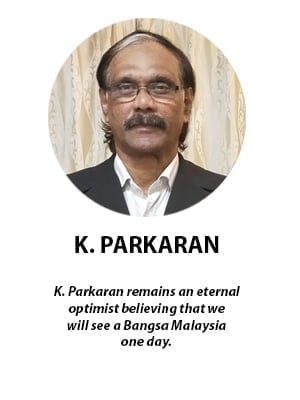FMT:
The merit in Nahvin’s plea for meritocracy
Many believe the time has come for Malaysia to gradually move to meritocracy.

University graduate M Nahvin did something that most students would not dare attempt by using his Royal Education Award acceptance speech to raise an issue which would have made the top officials present at the ceremony squirm in their seats.
Addressing attendees after he was named the top student at Universiti Teknikal Malaysia Melaka, the 23-year-old made an impassioned plea for meritocracy in the Malaysian education system.
Speaking to FMT later, he acknowledged that a change of such magnitude cannot be made overnight. Instead, he said the education system must undergo a gradual transformation towards meritocracy.
Nahvin has seen first-hand the hardships that the current system causes.
He cited the plight of his late friend who failed to gain admission to the matriculation programme despite doing as well as he did in his SPM examination. Many others with much lower grades gained entry, said Nahvin.
As a result, Nahvin said his friend became depressed, withdrew himself and started questioning his capabilities. Sadly, he passed away at a young age.
Nahvin did not reveal the cause of death but vowed not to let his friend’s passing be in vain.
‘Too sensitive’
What many might not know is that in the lead-up to the event, Nahvin was told to drop the issue from his speech because it was deemed “too sensitive”.
However, aware that this was his best platform, Nahvin decided to press ahead with the topic, earning the plaudits of many who attended the ceremony.
“Many of my lecturers and fellow students from all races and religions congratulated me on my speech. It is something that I did not expect,” he told me, adding that he was encouraged by the response.
Following his speech, an education NGO and several Malay academics were quoted in the media as expressing their support for his call, agreeing that the time has come for the Bumiputera preference policy in education to be gradually tweaked.
It was heartening to note that a top Malay leader from PKR, the party that leads the unity government, raised the matter at the party’s congress on Sunday. Party vice-president Awang Husaini Sahari said meritocracy is crucial to safeguard the interests of minority groups in the country.
Affirmation and deprivation
No doubt, there are similar policies in many other countries which aim to give those who, for historical or other reasons, were deprived of opportunities by being unfairly discriminated against.
It is there in India to restore the “backward classes” among its citizens. In 1994, South Africa introduced affirmative action for the blacks and Indians. Indonesia has it for the native Papuans, Taiwan gives special opportunities to its Aboriginals, while New Zealand reserves places in education and jobs for those of Māori and Polynesian descent.
However, most of these examples involve minority communities that are disadvantaged. Many countries, on the other hand, have laws that specifically make using race, religion and creed an offence when offering jobs or places in higher education.
Even though it is called positive discrimination or affirmative action, it is one and the same – it discriminates.
Any society can accept some level of discrimination in education and employment provided that it is aimed at uplifting standards across the board and achieving a diverse student population and workforce broadly representative of its racial make-up.
But Malaysia has already gone through more than 50 years of this policy since the New Economic Policy was introduced in 1970.
What was supposed to be a needs-based policy ended up being abused, with rich Malaysians snapping up government scholarships, jobs and promotions.
In the process, many poorer top-scoring students, both Malay and non-Malay, were deprived of the opportunities tailored for them.
Presently, the civil service and security forces are not representative of the racial make-up of the Malaysian population.
In July last year, a minister told Parliament that about 90% of the 1.2 million civil servants are Bumiputeras. That is an alarmingly disproportionate number.
Hardships and political reality
The Indian community has suffered immensely from discriminatory practices in education and employment as many families are not financially able to afford their children’s tertiary education. Many also are deprived of a better life due to a lack of access to government jobs.
Nahvin is well aware of the hardships faced by his community.
“Well, someone has to bring up injustices,” he said to me.
Shifting this policy overnight would obviously have serious implications for any ruling party in Malaysia as it would be vehemently opposed by a large section of the Bumiputera community who would not want to risk losing the special privileges they have enjoyed for the last five decades.
That is the political reality all Malaysians must accept.
But does that also mean that the outstanding performers in our local examinations should be deprived of due recognition and equal opportunities?
The government bears a responsibility to take corrective measures to ensure there is no unfair discrimination and that no Malaysian is left behind.
Let not Nahvin’s voice be just another one in the wilderness. The government must acknowledge it for what it is: a cry from non-Bumiputera Malaysians for some measure of equality, justice, fairness and dignity.
Is there meritocracy in Tamil Nadu? I doubt it.
ReplyDeleteU know Tamil Nadu?
DeleteYr original birth place!
Or yr f*cked understanding of meritocracy!